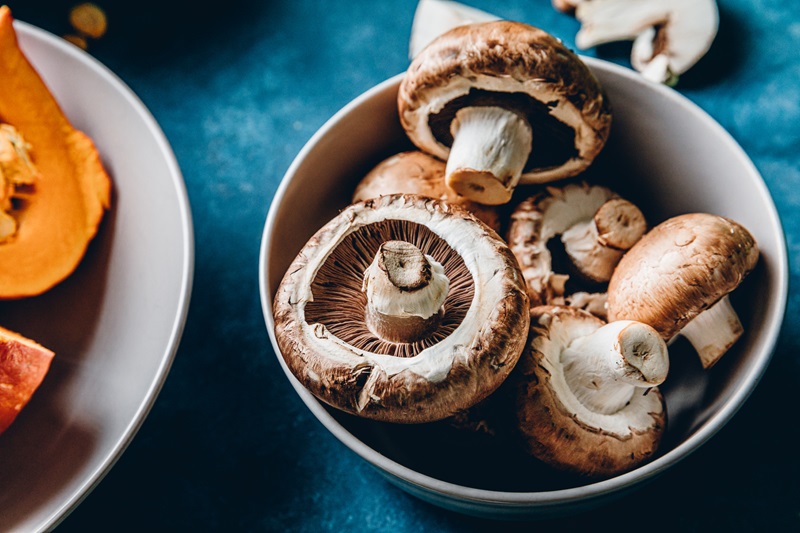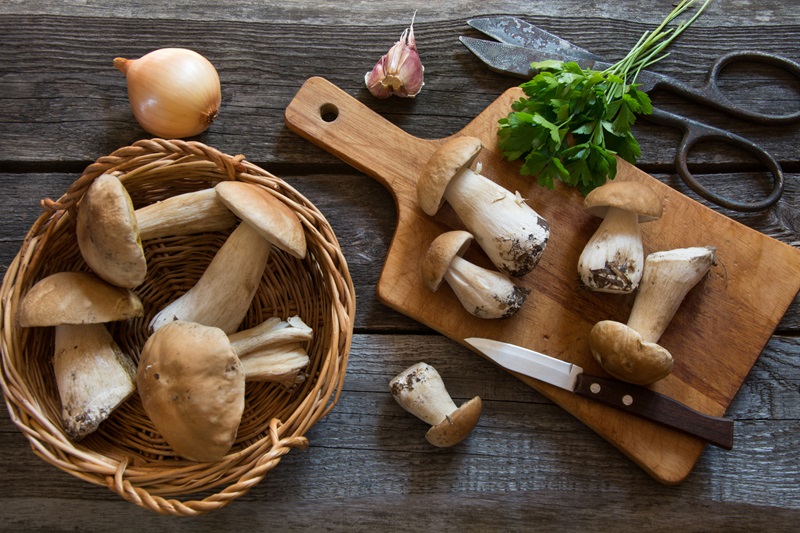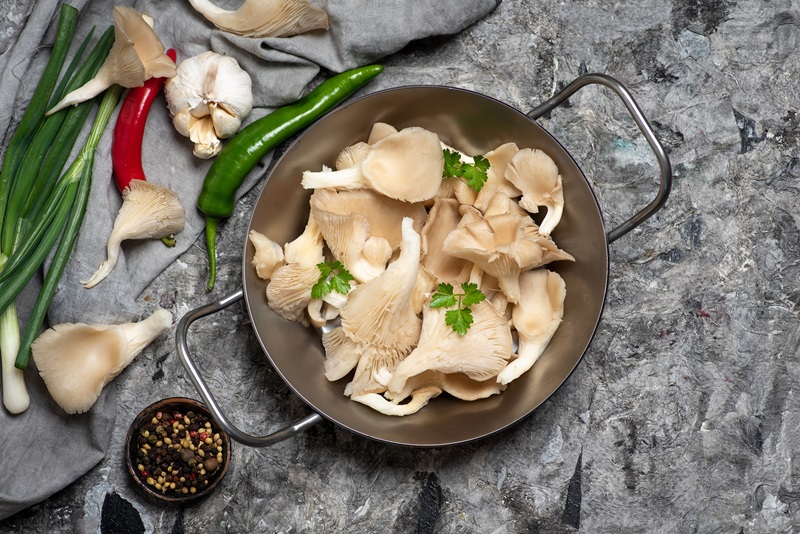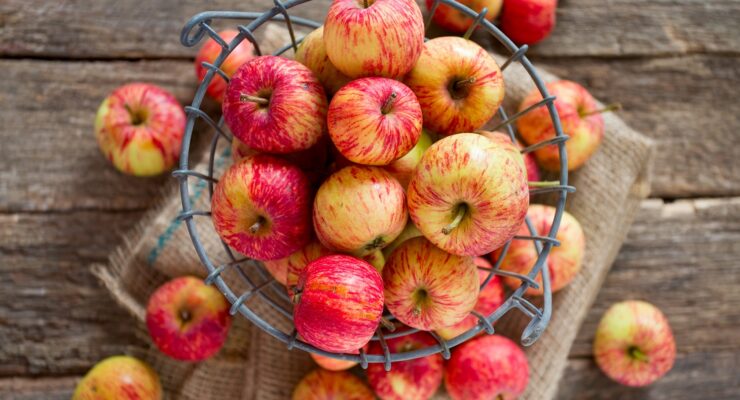Superfood Spotlight: The Health Benefits of Mushrooms
Article posted in: Diet & Nutrition Experts’ Corner
Mushrooms add rich, savory flavors to meals while being low in calories and high in fiber, making them an excellent ally in weight loss. If that’s not enough, mushrooms contain health properties – like antioxidants, phytochemicals and minerals – that can boost overall health, putting them squarely in the category of superfoods.
Best of all, they are considered an unlimited non-starchy vegetable on Nutrisystem, meaning you can fill up on as much as you like. Here are the best tips for boosting your mushroom intake to take full advantage of mushroom’s health benefits.
Types of Culinary Mushrooms

Due to mushroom’s superfood potential, you may have noticed mushroom supplements have become increasingly popular. Research on the effectiveness of these products remains limited, which means eating more mushrooms is still your best opportunity to reap all the flavor and nutrient benefits.
Popular culinary options include:
- White button mushrooms: great in stews, roasts and soups
- Portobello mushrooms: great to use as a substitute for meats
- Shiitake mushrooms: great for Asian-style dishes and soups
- Oyster mushrooms: a sweeter option that works well in pasta dishes
- Porcini mushrooms: most economical when bought dried, porcinis add depth and flavor to soups and stews
While the nutrition profile differs slightly between these varieties, all provide nutrients important to good health, such as B vitamins, copper, selenium, fiber, potassium and vitamin D. Experimenting with different types can help you discover your favorites.
Beyond their basic nutrition profile, these mushrooms also have unique antioxidant and anti-inflammatory properties that have researchers linking them to some interesting health benefits you’ll want to know about.
5 Surprising Mushroom Health Benefits

Mushrooms Promote Healthy Bones
Mushrooms are one of the few foods that can provide a good source of vitamin D, which helps improve calcium absorption, leading to better bone health.
The caveat is that mushrooms need to be exposed to sunlight or ultraviolet (UV) light to produce vitamin D. Inside the mushroom cell walls is a compound called ergosterol (similar to cholesterol in our cells). When exposed to UV light, ergosterol can convert to vitamin D.
Oyster and shitake mushrooms tend to have more ergosterol and, therefore, more Vitamin D potential. However, other mushrooms can also provide sufficient amounts.
However, many mushrooms in the grocery store have been grown in the dark, limiting their vitamin D content. You’ll want to check the labels to find options that state they’ve been exposed to UV light.
Mushrooms Support Immune Function
In addition to supporting bone health, vitamin D may help your immune system fight off certain viruses and bacteria. Mushrooms also contain selenium and vitamin B6, whose antioxidant and anti-inflammatory properties assist your immune system in keeping you healthy.
Mushrooms Protect Heart Health
Mushrooms contain potassium while being low in sodium, which is a great combination for keeping blood pressure controlled and blood vessels healthy. Further, a review of multiple studies linked mushroom intake with lower cholesterol and triglyceride levels – likely due to this food’s fiber, anti-inflammatory and antioxidant properties.

Mushrooms May Stimulate Gut Health
Studies show mushrooms contain unique prebiotic starches that help good bacteria in your gut flourish, improving overall gut health. A healthy gut eco-system has been linked to multiple health benefits, from improved digestion to a lower risk of obesity and chronic disease.
Mushrooms May Protect Brain Health
Mild cognitive impairment (MCI) is a condition that affects up to 18% of adults by age 70, impacting many daily activities due to diminished memory, thinking and decision-making skills.
However, experts suggest diet quality has a significant influence on the risk of developing MCI as we age. In particular, mushrooms may help reduce MCI risk due to an antioxidant called ergothioneine present in most mushroom varieties.
A recent study that looked at the dietary patterns of 600 adults over 60 years of age in Singapore found that subjects who ate two or more servings of mushrooms weekly (about one and a half cups) had around 50% lower odds of developing MCI.
Ideas to Boost Mushroom Intake

Any easy way to upgrade your diet with mushrooms is to use them as a healthy alternative to red meat, which is typically high in both sodium and saturated fats. According to a study from the Culinary Institute of America, substituting about 25% of the meat in ground beef dishes with white mushrooms can not only retain but also enhance flavor while reducing sodium content. Try it out in your next taco, hamburger or meatloaf dish!
Consider these ideas for more inspiration:
Button Mushrooms:
- In Salads: Add a fresh, earthy flavor to your salads with raw button mushrooms.
- In Omelets: Enhance your breakfast omelets with diced, sautéed button mushrooms.
- In Pasta Sauces: Simmer chopped button mushrooms in your favorite tomato-based pasta sauces for added depth.
Portobello Mushrooms:
- Grilled Mushroom Caps: Marinate portobello caps in balsamic vinegar then grill them for a side dish or as filling for a sandwich.
- Stuffed Mushrooms: Fill large portobello caps with cheese, breadcrumbs and herbs. Brown in the oven.
Porcini Mushrooms:
- In Risottos: Blend dried or fresh porcini mushrooms into creamy risottos.
- In Soups: Infuse broth-based soups with a rich, earthy flavor using dried porcinis.
- Roasted with Vegetables: Roast porcini mushrooms with a medley of vegetables and a drizzle of olive oil for a simple yet elegant side dish.
Shiitake Mushrooms:
- In Stir-Fries: Shiitake mushrooms will add an earthy, smokey flavor to any stir-fry dish.
- As Toppings: Garnish rice or noodles with shiitake mushrooms cooked in soy sauce.
Oyster Mushrooms:
- In Tacos: Try sautéed oyster mushrooms as a filling for vegetarian tacos.
- On Pizza: Top your homemade pizzas with oyster mushrooms.
References
- Cardwell G, Bornman JF, James AP, Black LJ. A Review of Mushrooms as a Potential Source of Dietary Vitamin D. Nutrients. 2018;10(10):1498. Published 2018 Oct 13. doi:10.3390/nu10101498
- National Institute of Arthritis and Musculoskeletal and Skin Diseases. Calcium and Vitamin D: Important at Every Age. National Institute of Arthritis and Musculoskeletal and Skin Diseases. Accessed 1/29/2024. https://www.niams.nih.gov/health-topics/calcium-and-vitamin-d-important-bone-health
- Centers for Disease Control and Prevention. Micronutrient Facts. Centers for Disease Control and Prevention. Accessed 1/29/2024. https://www.cdc.gov/nutrition/micronutrient-malnutrition/micronutrients/index.html#vitamind
- Krittanawong C, Isath A, Hahn J, et al. Mushroom Consumption and Cardiovascular Health: A Systematic Review. Am J Med. 2021;134(5):637-642.e2. doi:10.1016/j.amjmed.2020.10.035
- Ma G, Du H, Hu Q, Yang W, Pei F, Xiao H. Health benefits of edible mushroom polysaccharides and associated gut microbiota regulation. Crit Rev Food Sci Nutr. 2022;62(24):6646-6663. doi:10.1080/10408398.2021.1903385
- Hills RD Jr, Pontefract BA, Mishcon HR, Black CA, Sutton SC, Theberge CR. Gut Microbiome: Profound Implications for Diet and Disease. Nutrients. 2019;11(7):1613. Published 2019 Jul 16. doi:10.3390/nu11071613
- Feng L, Cheah IK, Ng MM, et al. The Association between Mushroom Consumption and Mild Cognitive Impairment: A Community-Based Cross-Sectional Study in Singapore. J Alzheimers Dis. 2019;68(1):197-203. doi:10.3233/JAD-180959
- Myrdal Miller A, Mills K, Wong T, et al. Flavor-enhancing properties of mushrooms in meat-based dishes in which sodium has been reduced and meat has been partially substituted with mushrooms. J Food Sci. 2014;79(9):S1795-S1804. doi:10.1111/1750-3841.12549







